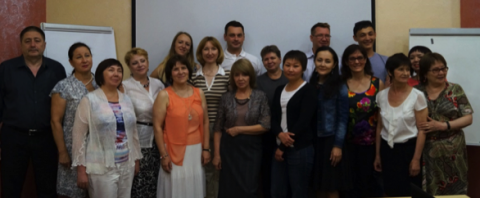Strengthening Public Participation in Decision-Making on Chemical Safety in Central Asia

A sub-regional skill share meeting of IPEN Participating Organizations (POs) took place in Almaty, Kazakhstan in June. The workshop was organized by Eco-Accord (IPEN Hub for the Eastern Europe, Caucasus and Central Asia (EECCA) region) and IPEN PO Greenwomen from Kazakhstan. The goal of the meeting was to strengthen NGO capacity in Central Asia to actively participate in decision-making processes on chemical safety. The meeting was part of the EECCA regional project on leveraging the new Mercury Treaty, to protect local communities from mercury pollution and promote national ratification of the Treaty in the EECCA region.
The meeting was attended by more than 30 people representing IPEN Participating Organizations from Kazakhstan, Kyrgyzstan, Tajikistan and Uzbekistan, the United Nations Development Programme (UNDP), business and consulting companies, and Kazakh governmental agencies. The agenda of the meeting covered key issues of the global chemical safety agenda and effectively linked them to the national situation in the targeted countries.
The meeting was opened with a presentation on IPEN activities at the international, regional and local levels. IPEN goals and objectives were highlighted, including major achievements of IPEN POs on the ground and globally. Throughout the meeting, additional presentations were made on implementating three global chemical treaties (Stockholm, Basel and Rotterdam) in Central Asia; legal and institutional aspects of chemicals and waste management in Central Asia; new POPs inventories; overview of the Minamata Convention and its early implementation by countries; projects aimed at addressing mercury contamination and mercury waste management in Central Asia; electronic waste in Kazakhstan; and an overview of the issues (such as highly hazardous pesticides, lead in paint and chemicals in products) that will be addressed at the 4th International Conference on Chemicals Managament. Information about specific situations relating to these issues in Kazakhstan, Kyrgyzstan, Uzbekistan and Tajikistan was shared by NGOs.
Additionally, IPEN POs from Kazakhstan talked about their fight to stop plans for construction of a hazardous waste incinerator in Pavlodar, Kazakhstan. Public activists in Pavlodar achieved huge success by collecting 120,000 signatures opposing the construction of the incinerator in just 6 days. The plans for the incinerator are currently being reviewed.
For more details about the meeting, see the agenda and read the full report (English) and NGO Statements (Russian) here.
